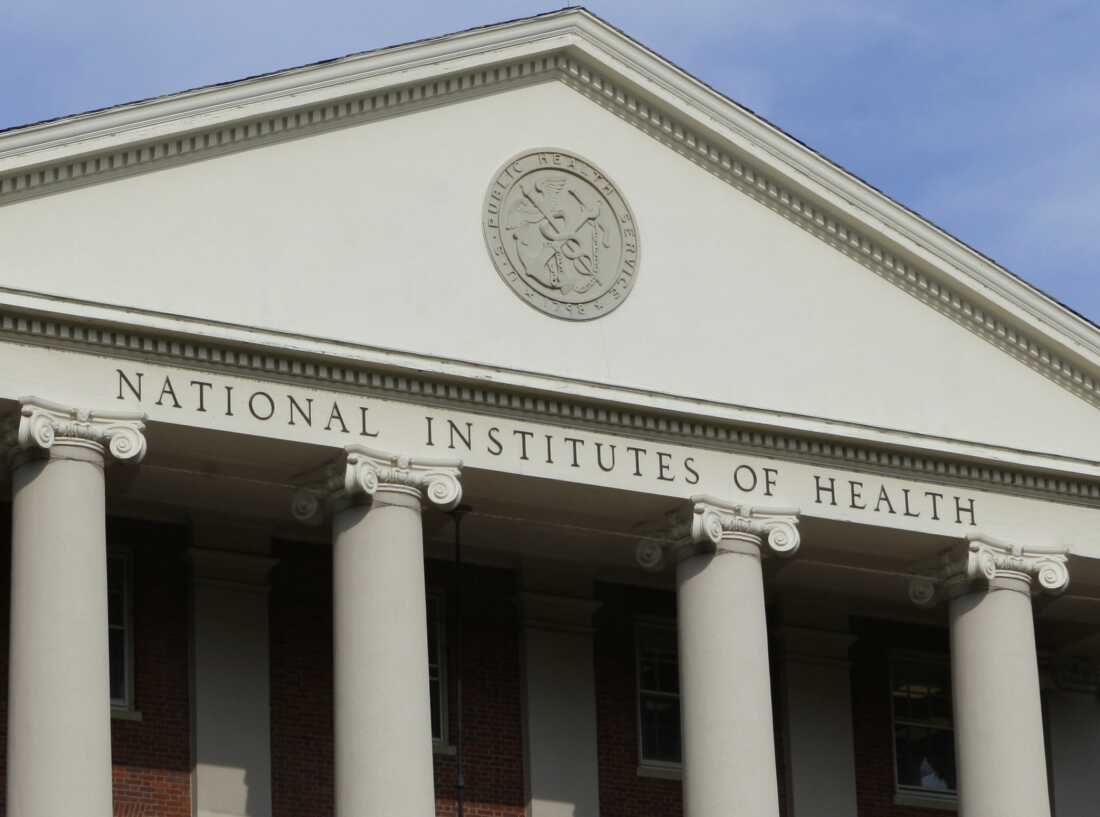
Funding is stalled for Nationwide Institutes of Well being analysis grants.
J. Scott Applewhite/AP
cover caption
toggle caption
J. Scott Applewhite/AP
The Nationwide Institutes of Well being has stopped contemplating new grant functions, delaying choices about how one can spend hundreds of thousands of {dollars} on analysis into ailments starting from coronary heart illness and most cancers to Alzheimer’s and allergy symptoms.
The freeze occurred as a result of the Trump administration has blocked the NIH from posting any new notices within the Federal Register, which is required earlier than many federal conferences might be held.

Whereas which will appear arcane, the stoppage compelled the company to cancel conferences to evaluation hundreds of grant functions, in response to two individuals accustomed to the state of affairs, considered one of whom was not licensed to talk publicly and the opposite who feared retribution.
Already, the assembly freeze has stalled about 16,000 grant functions vying for round $1.5 billion in NIH funding, one of many individuals who is accustomed to the grant-making course of mentioned.
Officers on the NIH hope to get the freeze on Federal Register notices lifted quickly to keep away from a extreme funding disruption. With an annual finances of almost $48 billion, the NIH is the most important public funder of biomedical analysis on the earth.
All requests for NIH grants undergo an intensive evaluation course of. Annually there are about 2,600 conferences involving some 28,000 scientists, medical doctors, directors and different skilled reviewers. Their choices hold the NIH funding flowing to greater than 300,000 researchers at greater than 2,500 universities, medical faculties and different establishments.
However due to the freeze, “functions will are available in and principally they go right into a black gap and nothing might be finished with them,” mentioned the particular person accustomed to the NIH grant-making course of. “That’s the place we are actually.”

Some members of these committees, together with key gatherings often known as “research sections,” expressed frustration.
“At this time, I used to be meant to be serving on one of many many cancelled Nationwide Institutes of Well being research sections,” Annika Barber, assistant professor of molecular biology and biochemistry at Rutgers College, mentioned throughout a briefing Thursday protesting the disruption of biomedical analysis funding. “And as an alternative of offering suggestions on essential biomedical analysis for federal funding, I am right here to elucidate what America is shedding after we lose fundamental science analysis.”
Some outdoors observers defended the state of affairs.
“A short lived pause in publicizing or funding new grants with a view to evaluation them is typical for a brand new administration,” Choose Glock, director of analysis and a senior fellow on the Manhattan Institute, a conservative suppose tank, wrote in an e-mail to NPR.
Quickly after Trump was inaugurated, the federal authorities froze all grants, together with NIH grants. However that freeze was quickly blocked by a federal choose.
Some researchers suspect the NIH’s Federal Register freeze is an try to bypass that ruling.
Different observers dispute that interpretation.
“I don’t suppose this pause is an finish run across the court docket order blocking the sooner, extra common funding freeze, as a result of that freeze handled many various applications, together with some that the chief didn’t have the facility to delay,” Glock mentioned. “If the Trump administration continued such a pause on Federal Register notices indefinitely, then there can be a superb argument that that was an impoundment that may be stopped by a court docket, however a brief pause on Federal Register notices looks as if a extra typical probability for evaluation.”
Even a number of the NIH’s largest supporters imagine the company may benefit from adjustments, equivalent to making the grant-making course of extra clear. However some observers say the Trump administration’s strategy thus far has been indiscriminate and counterproductive.
“I feel they’re systematically dismantling the entire course of with which we have now been funding scientific analysis for 80 years, and it’s totally, very unhappy,” mentioned one of many individuals accustomed to the NIH funding course of who spoke to NPR. “There isn’t any query the system will not be good and might be improved upon. However the system can work effectively sufficient that we should not tackle the issue by blowing all the pieces up, which is what they’re doing.”
Neither NIH nor the Division of Well being and Human Providers, of which it’s a half, instantly responded to NPR’s request for remark.
It was unclear if the freeze on Federal Register notices was being imposed on different companies. However the transfer has intensified fears of funding and program cuts at NIH and amongst hundreds of scientists who depend upon the company for funding.
The NIH has been hit with cuts to its workforce, shedding about 1,200 individuals thus far. On the identical time, the Trump administration is attempting to cap the speed at which the NIH pays for the oblique prices of doing medical analysis at 15%, which is way decrease than the speed that has been paid at many establishments. Scientists say it may cripple medical analysis. A federal choose in Boston is deciding whether or not the cap can go ahead.
Many scientists worry the strikes are just the start of what may finally result in a restructuring of the NIH. Robert F. Kennedy Jr., who now leads HHS, which oversees the NIH, has mentioned it wants main reforms.
As well as, Dr. Jay Bhattacharya, the Stanford College researcher President Trump has nominated to be director of the NIH, has additionally criticized the company. Some Republican members of Congress and conservative suppose tanks have proposed main adjustments to the NIH, together with sending many of the company’s $48 billion on to states by block grants.
